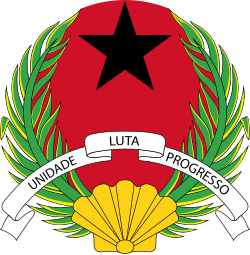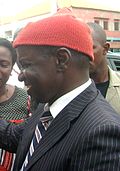No. Portrait Name(Birth–Death) Elected Term of office Political party Took office Left office Tenure 1 Luís Cabral (1931–2009) [ c] 1976–77 24 September 1973 14 November 1980(Deposed in a coup ) 7 years, 51 days PAIGC 2 João Bernardo Vieira (1939–2009) — 14 November 1980 14 May 1984 3 years, 182 days Military / PAIGC — Carmen Pereira (1937–2016) — 14 May 1984 16 May 1984 2 days PAIGC (2) João Bernardo Vieira (1939–2009) 1984 1989 1994 16 May 1984 10 May 1999(Deposed in a coup ) 14 years, 359 days PAIGC President of the Republic from 29 September 1994 — Brigadier general Ansumane Mané (c. 1940 — 7 May 1999 14 May 1999 7 days Military — Malam Bacai Sanhá (1947–2012) — 14 May 1999 17 February 2000 279 days PAIGC 3 Kumba Yala (1953–2014) 1999–2000 17 February 2000 14 September 2003(Deposed in a coup ) 3 years, 209 days PRS — General Veríssimo Correia Seabra (1947–2004) — 14 September 2003 28 September 2003 14 days Military — Henrique Rosa (1946–2013) — 28 September 2003 1 October 2005 2 years, 3 days Independent (2) João Bernardo Vieira (1939–2009) 2005 1 October 2005 2 March 2009(Assassinated ) 3 years, 152 days Independent — Raimundo Pereira (born 1956) — 3 March 2009 8 September 2009 189 days PAIGC 4 Malam Bacai Sanhá (1947–2012) 2009 8 September 2009 9 January 2012 [†] 2 years, 123 days PAIGC — Raimundo Pereira (born 1956) — 9 January 2012 12 April 2012(Deposed in a coup ) 94 days PAIGC — Major general Mamadu Ture Kuruma (born 1947) — 12 April 2012 11 May 2012 29 days Military — Manuel Serifo Nhamadjo (1958–2020) — 11 May 2012 23 June 2014 2 years, 43 days Independent 5 José Mário Vaz (born 1957) 2014 23 June 2014 27 February 2020 5 years, 249 days PAIGC (Until 2015) Independent (From 2015) — Cipriano Cassamá (born 1959) [ 7] [ 8] — 27 June 2019 29 June 2019 2 days PAIGC 6 Umaro Sissoco Embaló (born 1972) 2019 27 February 2020 26 November 2025(Deposed in a coup ) 5 years, 272 days Madem G15 — Brigadier general Dinis Incanha (born 1960) [ 9] of the High Military Command for the Restoration of National Security and Public Order [ 10] [ 11] [ 12] — 26 November 2025 27 November 2025 1 day Military — General Horta Inta-A Na Man (born c. 1960 [ d] [ 5] — 27 November 2025 Incumbent(Announced term end on 27 November 2026 ) 38 days Military 













